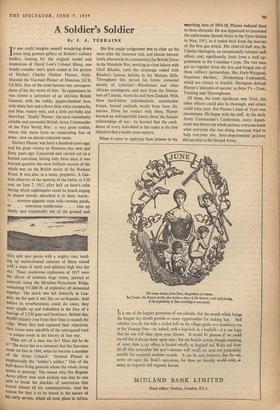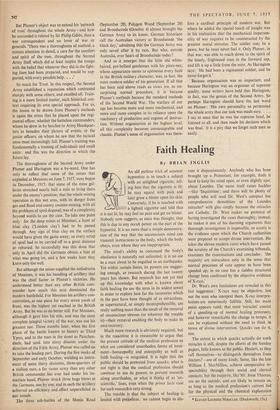A Soldier's Soldier
By J. A. TERRAINE F one could imagine oneself wandering down Isome long portrait gallery of Britain's military leaders, looking for the original model and inspiration of David Low's Colonel Blimp, one would consider one's quest ended at the picture of Herbert Charles Onslow Plumer, Field- Marshal the Viscount Plumcr of Messines, GCB, GCMG. One of the most famous war correspon- dents of his day wrote of him : 'in appearance he was almost a caricature of an old-time British General, with his ruddy, pippin-cheeked face, with white hair and a fierce little white moustache, and blue, watery eyes, and a little pot-belly and short legs.' Daddy' Plumer : the most consistently reliable and successful British Army Commander of the First World War : a very great soldier, whose title stems from an outstanding feat of arms: now an almost unknown name.
Herbert Plumer was born a hundred years ago, and his great victory at Messines was won just forty years ago. Conceived and carried out as a limited operation, lasting only three days, it was beyond question the most brilliant success of the whole war on the British sector of the Western Front. It was also, in a sense, prophetic. A Ger- man observer of the opening of the battle, at 3.10 a.m. on June 7, 1917, after half an hour's calm during which nightingales could be heard singing in distant woods, described it in these words: . . nineteen gigantic roses with carmine petals, or . enormous mushrooms . . . rose up slowly and majestically out of the ground and then split into pieces with a mighty roar, send- ing up multicoloured columns of flame mixed with a mass of earth and splinters high into the sky.' These mushroom explosions of 1917 were the effects of nineteen huge mines, planted at intervals along the Messines-Wytschaete Ridge, containing 957,000 lb. of explosive, all detonated together. The shock was felt distinctly in Lon- don; on the spot it was like an earthquake. And before its reverberations could die away, they were caught up and redoubled in the fury of a barrage of 2,330 guns and howitzers. Behind this, 80,000 infantry rose from their lines to assault the ridge. When they had captured their objectives, their losses were one-fifth of the anticipated total —a unique event in the history of that war.
What sort of a man was he? How did he do 117 The secret lies in a comment that the Spectator made on him in 1904, when he became a member of the Army Council : 'General Plumer is emphatically the "soldier's soldier." One of the half-dozen living generals whom the whole Army unites in praising.' The reason why this Regular Army oflicer won such acclaim was that he was able to break the shackles of convention that bound almost all his contemporaries. And the reason for that is to be found in the nature of Ills early service, which all took place in Africa. His first major assignment was to clear up the mess after the Jameson raid, and almost immed- iately afterwards he commandedthe British forces in the Matabele War, working in-close liaison with Cecil Rhodes, until - the campaign ended with Rhodes's famous Indaba in the Matopo Hills. Throughout this period his forces consisted mainly of 'colonials'—Rhodesians and other African contingents, and men from the Domin- ions of Canada, Australia and New Zealand. With these hard-bitten individualistic, unorthodox troops, formal methods would have been dis- astrous. From his contact with them, Plumer learned an unforgettable lesson about the human relationships of war : he learned that the confi- dence of every individual in the ranks is the first objective that a leader must capture.
When it came to applying these, lessons in the searching tests of 1914-18, Plumer reduced them to three elements. He was appointed to command the unfortunate Second Army in the Ypres Salient in May, 1915, as it reeled back from the horrors of the first gas attack. His chief-of-staff was Sir Charles Harington, an exceptionally talented staff officer, and, significantly, fresh from a staff ap- pointment in the Canadian Corps. The two men got on together from the first and forged one of those military partnerships, like Foch-Weygand, Napoleon - Berthier, Hindenburg - Ludendorff, which are always so fruitful. Harington defined Plumer's 'elements of success' as three T's—Trust, Training and Thoroughness.
Of these, the most significant was Trust, for other officers could also be thorough, and others could train men. But Plumer's kind of Trust was uncommon. He began with his staff. At the daily Army Commander's Conference, every depart- ment was shown the whole picture, everyone knew what everyone else was doing, everyone tried to help everyone else. Inter-departmental jealousy did not exist in the Second Army. But Plumer's object was to extend his 'network of trust' throughout the whole Army--7and how he succeeded is related by Sir Philip Gibbs, then a war correspondent and no lover of war or generals. 'There was a thoroughness of method, a minute attention to detail, a care for the comfort and spirit of the men, throughout the Second Army Staff which did at least inspire the troops with the belief that whatever they did in the fight- ing lines had been prepared, and would be sup- ported, with every possible help. . .
So much for Trust. In this respect, the Second Army established a reputation which contrasted sharply with some others, and excelled all. Train- ing is a more limited matter, each historical con- text requiring its own special approach. For us, the lesson to be drawn from Plumer's methods is again the stress that he placed upon the regi- mental officer, whether the battalion commanders, whom he drew in by batches to Army Headquar- ters to broaden their picture of events, or the junior officers, on whom he saw that the tactical onus must increasingly fall. Plumer's training was fundamentally a training of individuals and small units : and this was the direction in which the future lay.
The thoroughness of the Second Army under Plumer and Harington was a by-word. One has only to reflect that some of the mines that exploded at Messines on June 7, 1917, were begun in December, 1915; that some of the mine gal- leries stretched nearly half a mile to bring them under the enemy's position; that the whole mining operation in this wet area, with its danger from gas and flood and enemy counter-mining, with all the problems of spoil disposal, was of a complexity beyond words to see the case. To take one point only : for the deep mines at Messines, a layer of blue clay (London clay') had to be passed through. Any sign of blue clay on the surface would have given the game away; so every scrap of spoil had to be carried off to a great distance or reburied. So successfully was this done that only in April did the Germans obtain a hint of what was going on, and a few weeks later they knew only too well.
But although the mines supplied the melodrama of Messines, it was his handling of artillery that was the chief factor in Plumer's victories. He understood better than any other British com- mander how much this arm dominated the modern battlefield. For Messines his artillery con- centration, at one piece for every seven yards of front, was the highest yet reached in the. British Army. But he was to do better still. For Messines, although it gave him his title, and was the most complete integral victory of the war, was not his greatest test. Three months later, when the first phase of the battle known to history as Third Ypres, and to the man in the street as Passchen- daele, had sunk into slimy disaster under the direction of the Fifth Army, Plumer was called on to take the leading part. During the five weeks of September and early October, wielding an instru- ment of some thirty divisions, three-quarters of a million men, a far vaster army than any other British commander has ever had under his im- mediate hand, Plumer struck three huge blows at the Germans, one by one, and in each the artillery achieved an•efficiency and effect unparalleled in our annals.
The three sub-battles of the Menin Road (September 20), Polygon Wood (September 26) and Broodseinde (October 4) almost brought the German Army to its knees. German historians call the Australian victory at Broodseinde `the black day,' admitting that the German Army was only saved after it by rain. But who, outside Australia, ever hears of Broodseinde today?
And so it emerges that the little old white- haired, pot-bellied gentleman with his pince-nez, whose appearance seems to epitomise every fault in the British military character, was, in fact, the most modern soldier of his generation. If all that has been said above reads as vieux jeu, as un- surprising normal procedure, it is because Plumer's methods became the standard methods of the Second World War. The warfare of our age has become more and more mechanical, and more and more complex in its reliance upon the machinery of production and engines of destruc- tion. Without organisation at the highest level, all this complexity becomes unmanageable and chaotic. Plumer's sense of organisation was there- fore a cardinal principle of modern war. But where he added the special touch of insight was in his realisation that the mechanical imperson- ality of war requires to be counteracted by the greatest moral stimulus. The soldier may be a pawn, but he must never feel it. Only Plumer, in that war, was able to reach down to the spirit of the lonely, frightened man in the forward sap, and lift it up a little from the mire. As Harington says : 'He had been a regimental soldier, and he never forgot it.'
Because organisation was so important, and because Harington was an organiser of supreme quality, some writers have held that Harington, in fact, was the genius of the Second Army. So perhaps Harington should have the last word on Plumer : 'His own personality so permeated the whole army that our task was made easy. . . . I say at once that he was the supreme head, he listened to, all, and then made his decision which was final.' It is a pity that we forget such men so easily.



































 Previous page
Previous page